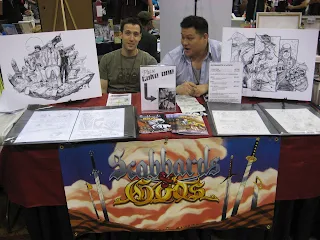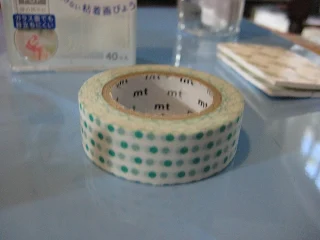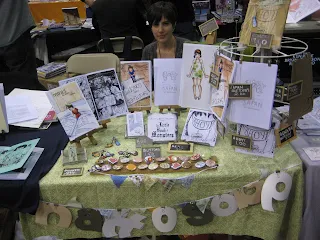All The Small Things
Essentials for Convention Setups
 |
| Your suitcase should not look like this. It is way overpacked. It's just oozing convention setup. |
All comic conventions are different, and may require different gameplans and table setups. Good planning and decent research should help you prepare for the individual needs of each convention, but I feel that every good convention setup shares five things in common, no matter the convention. As long as you cover those basics, you'll be on the right track for a successful convention.
5 Convention Essentials
Display (Including banners,signs, and props)Demo materials
Room to draw
Space to store materials/stock
Portage
Display
Your display is the first thing people notice about your table. Ideally, your display should be both attractive and highly visable. This is extremely important in competitive convention environments such as mainstream superhero comic cons and anime cons, where the banners reach for the sky.
Types of Display Include
Standing banners| Image via here. |
| Typical superhero convention artist alley. If you look closely, you can see the standing banners behind the tables. Image via here |
Hanging banners (tablefront)
| A pretty good explanation of the typical hanging banner. Image via here. |
| And one in action, although not at a convention. Image via here. |
 |
| Here's a really cool hanging banner. |
Structural Display
Stacking Mesh Crates
| Image via Amazon, where you can order these if you like. |
| If you look, you can see the crates in use in the back. Image via here. |
| And here it's used to prominently display badges. Image via here. |
Cubes aren't your only option. Most craft supply stores have a variety of shelving options available on the cheap. My tabletop vertical display came from Micheal's.
 |
| These shelves attractively display the wares. |
Structural displays can include pipes, which are ideal for displaying banners or teeshirts.
Or you could build a display out of foamcore, which gives you the option of creating something truly one of a kind. The problem with this is you need to pack it securely, lest it risk breaking in transit.
On Table Display
 |
| Adjustable tabletop easel, small display easel (dismantles for easy storage), business card holder (good for minis' less than 5". Anything larger will topple backwards) |
Easels
Business card holders
Picture frames
Book stands
These are all fairly cheap and easily available. There's a variety of organizational tools sold at most office supply stores that are ideal for table top displays. I got my easels off Amazon for fairly cheap.
Small Scale Signage
 |
| Tiny chalkboards and chalkboard stickers can be written on using liquid chalk. It's less likely to erase than real chalk, but almost as easy to clean up (water and a paper towel work just fine). |
Table-top signs
Pricing and explanation signs
While a printed sign is nice, an easily altered sign can be convenient. Your signs don't have to be fancy, I've seen post-it notes utilized with success.
I vary my display depending on the type of convention I'll be attending. At a superhero or anime convention, I'll make sure to pack my banner, although I'd leave that at home for a mini comic con. Anime cons have extremely vertical displays built up using mesh boxes, and while I'm not a fan of those, if I'm attending an anime con, I'll pack those. I try to keep my display consistent by following a theme, and while the structure may change, the things that support my theme stay the same.
Your Signage Should:
Be easily visibleBe attractive
Mesh well with the rest of your setup
Be easy to read.
Should not compete with your demo materials for the audience's attention once they reach the table.
Should comply with the rules of that convention. For example, Fluke did not allow 6' floor banners in the middle of the convention floor, you had to set up using a side wall. This required several vendors to pack up their set ups and move.
Demo Materials
Demo materials are the books, bookmarks, charms, minicomics, paperdolls, whatever that you can afford to have damaged. Its good to designate one set of materials as your 'demo' materials, and encourage your audience to handle them. I recommend keeping the rest of your stock under the table, and retrieving fresh stock for the customer to purchase.
I like to have two copies on the table at a time, one copy up high to attract attention, and one copy that's easy to flip through, or even open.
Miscellaneous
 |
| A variety of items hold my table together. |
 |
| Washi tape is both functional and attractive. |
 |
| These adhesive dots are a bit overly sticky, and should only be used on demo copies. |
 |
| More adhesive options |
BONUS!
Decor
As long as it's not too distracting from your wares, a little table decor can set you apart from the crowd. I utilize a celery green tablecloth (a color that links all my work) and an adorable miniature bunting to help tie my table together. A tablecloth doesn't have to be expensive, mine's just two yards of unhemmed quilting cotton. |
| These figures aren't part of the merchandise, but they lend to the overall theme of the table and make these vendors stand out. |
Maintain Workspace
You might be tempted to fill your space with wares, but having room to draw is important, because it also implies room to take notes, count bills at, and do general housekeeping. Don't think you'll be doing this amid your wares, that's pretty unprofessional and opens you up to theft, as others can see how much money you have. A cashbox isn't a bad investment, but make sure you keep your key with you. You should keep this in mind at conventions where a lot of your sales come from commissions (superhero and anime conventions), but its still necessary at other cons. If there isn't much room at your table, you could consider bringing a lapboard with you. Its important that you appear busy during the con, as this helps generate further commissions (implies you're in demand), shows that you're a dedicated worker, and keeps you from nagging customers.
Storage
 |
| Bottom to top: Books and miscl small things, buttons and charms, clippy things, keys and my Square tool. |
Portage and Portability
 |
| Even the best packed luggage can get thrown from an airplane onto the pavement. PACK WELL. |
 | ||
| And thus, we return to my rolly suitcase. This suitcase is fine for local cons, when I can carry a fair amount of my supplies outside the suitcase, but for cons where I have to fly, it is a no go. |











This is a great sequential artist's convention primer. I think everyone's figured out there isn't a shortcut to success, but if you can prepare and organize well maybe you can get there all the faster! Your advice is always helpful and I hope this prevents an unsuspecting artist from coming unprepared, or heaven forbid, OVER prepared. SOMEONE out there has brought a table and chairs to artist's alley before I'm sure.
ReplyDelete